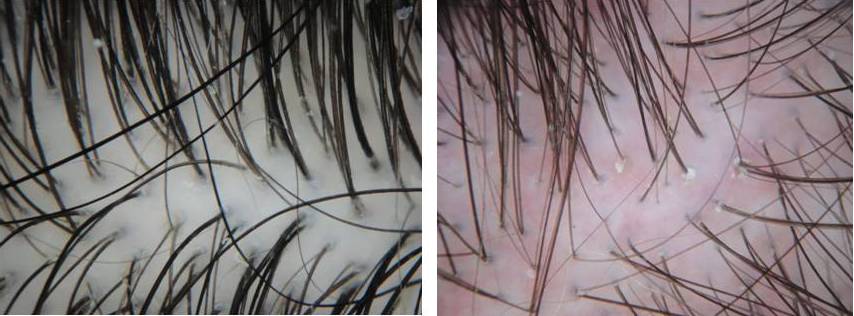Scalp Redness: More than the Summer Sun?
Many Normal scalp (left) vs scalp redness (right) in patient with scarring alopeciascalp conditions can be associated with redness in the scalp. The medical term for redness is “erythema.”
Scalp erythema always catches my attention and I prompts me to spend time examining the scalp for "worrisome" scalp conditions. Although patients returning from summer holidays and long periods in the summer sun often attribute scalp redness simply to sun exposure, this is not always the case. Many conditions need to be considered. Here, I briefly review a dozen causes of scalp redness.
1) Irritation
Many products that required application to the scalp or hair can cause irritation. These include cosmetic products, hair sprays, mousse, gel, and hair dyes. Some hair loss treatments can also be associated with irritation, including minxodil and other topical products containing irritants such propylene glycol.
2) Allergy
Products such as shampoos and hair dyes and even some cosmetic products can cause allergic reactions in the scalp. Although some patients with allergy have itching in the scalp, many patients do not. These patients may have only a rash on the neck, ears or back where the product came into contact with the skin.
Seborrheic dermatitis is an inflammatory scalp condition which affects about 5 % of adults. Men are more commonly affected than women. The condition occurs on body sites where the skin is oily such as the scalp, eyebrows, eyelids, sides of nose and chest. Patients with seborrheic dermatitis of the scalp develop red, itchy and flaky skin. The scales can be yellow, white or grey colored and are often described as being "greasy." This differs from scalp psoriasis where the scales are often silver and powdery (see below).
4) Psoriasis
Psoriasis is complex immune-based disease which can affect the skin, nails and joints. Psoriasis of the scalp occurs in about one-half of patients with skin psoriasis. Patients have scalp redness, scaling, and flaking. Patients may also have troublesome itching. Although the redness and flaking often cause embarrassment, scalp psoriasis does not usually cause hair loss. The diagnosis of scalp psoriasis is typically quite straight forward as most patients also have evidence of psoriasis somewhere else on the body.
5) Infection
Bacterial, viral and fungal infections may cause redness in the scalp. Determining the specific cause may come from a careful history and scalp examination and sometimes submission of a swab or piece of scalp tissue to the microbiology laboratory.
Bacteria, such as staphylococci, may cause scalp infections. Bacteria may also contribute to infection of the hair follicle, which is a condition called "bacterial folliculitis." A variety of viral infections cause scalp redness. Chicken pox and shingles are two such examples. Scalp ringworm or “tinea capitis” refers to infection of the scalp by certain types of fungi. Scalp redness and scaling may be seen in these cases.
Alopecia areata is an autoimmune condition affecting about 2 % of the population. The scalp in patients with alopecia areata is usually normal in color but may be pink or peach colored in some cases. A variety of clinical types of alopecia areata are seen.
7) Scarring alopecias
Scarring or "cicatricial" alopecias are hair loss conditions which lead to permanent loss of hair. These conditions may be associated with scalp redness. The right panel of the accompanying photo shows scalp redness in a patient with early stages of a scarring alopecia known as lichen planopilaris.
8) Scalp Injury and Trauma
Patients with scalp injuries, either due to previous accidents or surgeries, may have persistent scalp redness. Burns from chemicals, fire or radiation can cause scalp redness. Burns from ultraviolet radiation, such as might occur on a sunny day, can cause scalp rendess. Patients receiving radiation for head and neck cancers and brain tumors can also develop scalp redness.
9) Sun damage
Patients with extensive sun damage, from years of sun expose, may frequently have a red scalp.
10) Cancers
A variety of skin pre cancers and cancers, including non melanoma skin cancers, can cause redness in localized areas of the scalp. A biopsy may be obtained to reach the diagnosis.
11) "Red Scalp Syndrome"
'Red scalp syndrome" is a condition which occurs in patients who have persistent redness of the scalp that is not explainable by any other condition. The condition was first described in 1987 by Drs Thestrup-Pederson and Hjorth. Patients with the Red Scalp Syndrome may have itching and burning but typically do not have scaling or flaking.
12) Other inflammatory diseases
A wide variety of other inflammatory conditions, including lupus, dermatomyositis and rosacea can be associated with redness in the scalp.
Conclusion
Many individuals with scalp redness attribute the redness to too much sun exposure. All in all, there are many causes of scalp redness and each needs to be carefully considered. Fortunately, the cause of the redness can often be diagnosed from a thorough examination of the scalp. In complex or challenging situations, a scalp biopsy might be performed to confirm the diagnosis.
This article was written by Dr. Jeff Donovan, a Canadian and US board certified dermatologist specializing exclusively in hair loss.

